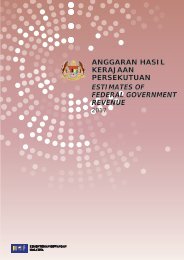WEALTH
2c0esX1
2c0esX1
Create successful ePaper yourself
Turn your PDF publications into a flip-book with our unique Google optimized e-Paper software.
FOCUS<br />
by experts. Typical is Eduardo Banzon, senior health<br />
specialist with the Asian Development Bank, who believes<br />
the country provides a good model for delivering universal<br />
health at low cost.<br />
In over 40 years of commitment, Thailand has markedly<br />
improved life expectancies for males and females, he notes.<br />
“What’s more, infant mortality has dropped sharply from<br />
68 per 1,000 live births in 1970, to below 10 in 2006.”<br />
When compared to countries with similar income<br />
levels, Thailand’s achievements stand out. There has<br />
also been a dramatic decline in under-five mortality<br />
through a reduction of respiratory infections, heart failure,<br />
communicable and parasitic diseases and diarrhea. Child<br />
immunization rates for diphtheria, tetanus and whooping<br />
cough even exceed the rates in some Western European<br />
countries. All of this has been achieved at relatively low cost<br />
in terms of health expenditure per capita and percentage of<br />
GDP devoted to health (6.5% in 2014).<br />
“I think Thailand can be proud of its successes,” says<br />
Suthana Setawanna, the director of healthcare services in<br />
Thailand. “The country has an impressive record of health,<br />
particularly in fighting diseases associated with poverty.<br />
We have achieved a good standard of sustainable medical<br />
coverage for all and in levelling differences between the<br />
rich and poor.”<br />
He continues, “The system has transformed dramatically.<br />
And judging by the surveys, people are quite aware of how<br />
special it is. It typically receives 90% or more satisfaction<br />
rate.”<br />
DENTAL WORK IN THE LAND OF SMILES<br />
In Thailand, improving healthcare has been a priority<br />
ever since 1961, when the National Economic and Social<br />
Development Plan was launched. Based around the notion of a<br />
right to a healthy life, successive five-year plans saw facilities<br />
continually upgraded and expanded into rural areas.<br />
Initiatives such as establishing nurses and midwifery<br />
colleges, combined with hometown placement, limited<br />
the drain of skills to Bangkok. Compulsory placement<br />
programs see young doctors serve up to three years<br />
in remote areas to limit the concentration of professionals<br />
in Bangkok.<br />
It was, however, the election of Prime Minister<br />
Shinawatra in 2001 that finally saw the system become<br />
accessible to all. Under the slogan of “30 baht treats all”<br />
($0.85), the system switched from subsidized healthcare to<br />
a guaranteed access to a set of services, including free<br />
prescription drugs, outpatient care and hospitalization, as<br />
well as expensive services, such as radiotherapy and<br />
surgery. Importantly for a country known as “the land of<br />
smiles,” the system also covers basic dental work.<br />
The 30 baht referred to the co-payment amount that<br />
patients paid for every doctor’s visit or hospital admission,<br />
but financing comes from progressive taxation. Those who<br />
can pay usually opt for higher quality services, or have<br />
private insurance for access to the well-developed private<br />
medical sector.<br />
One consequence has been a decline in out-of-pocket<br />
expenses, which, according to the World Health<br />
Organization, reduced the number of non-poor households<br />
impoverished by ruinous health bills. In 1994, 45% of the<br />
total health expenditure of the country came from<br />
households. By 2010, this had fallen to 15%, lower than the<br />
OECD average of 17.9%. The launch of the scheme in 2002<br />
also changed the lives of the poor as healthcare was<br />
extended to the 18.5 million people previously uninsured,<br />
out of a total population of 62 million.<br />
Yet the Thai system faces challenges. “There are issues<br />
concerning financing, workload and efficiency,” says<br />
Suporn Patcharatakul. A doctor who worked in the public<br />
system before being appointed as vice president of the<br />
Medical Department at Allianz Ayudhya Assurance in 2013,<br />
Patcharatakul speaks at first hand of conditions on the<br />
hospital wards.<br />
“There is mounting frustration amongst medical staff<br />
at the workload they are shouldering, as well as the far<br />
lower pay in the public sector,” he comments. “These always<br />
exist in any system, but the differences in Thailand have<br />
starkly increased over the years.”<br />
Numbers bear him out. As access has improved, people<br />
have used the services more often. Total annual outpatient<br />
visits increased from 111.9 million in 2003 to 153.4 million<br />
in 2010, while admissions increased from 4.3 million to 5.6<br />
million for a population that only increased slightly, which<br />
is placing stress on the system.<br />
Financing is a perennial issue. Costs have risen since<br />
the scheme's inception. With the co-payment scrapped in<br />
2006, the Thailand government is shouldering more of the<br />
costs compared to other middle-income countries. The<br />
government spend on healthcare has trebled since 1995<br />
from 1.5% as a share of GDP.<br />
“Rising costs could threaten the efficiency of the system<br />
in the future, especially if budget cuts come in,” agrees<br />
Setawanna. “However the increasing escalation of costs is<br />
also due an increase in the chronic diseases associated<br />
with an aging population.”<br />
The country now needs to readjust its successful<br />
system, he believes, to help handle costly non-communicable<br />
diseases at the community level rather than in hospitals.<br />
“This, along with disease prevention and better health<br />
promotion, will be important for Thailand to keep its health<br />
system sustainable.”<br />
Allianz • 35



